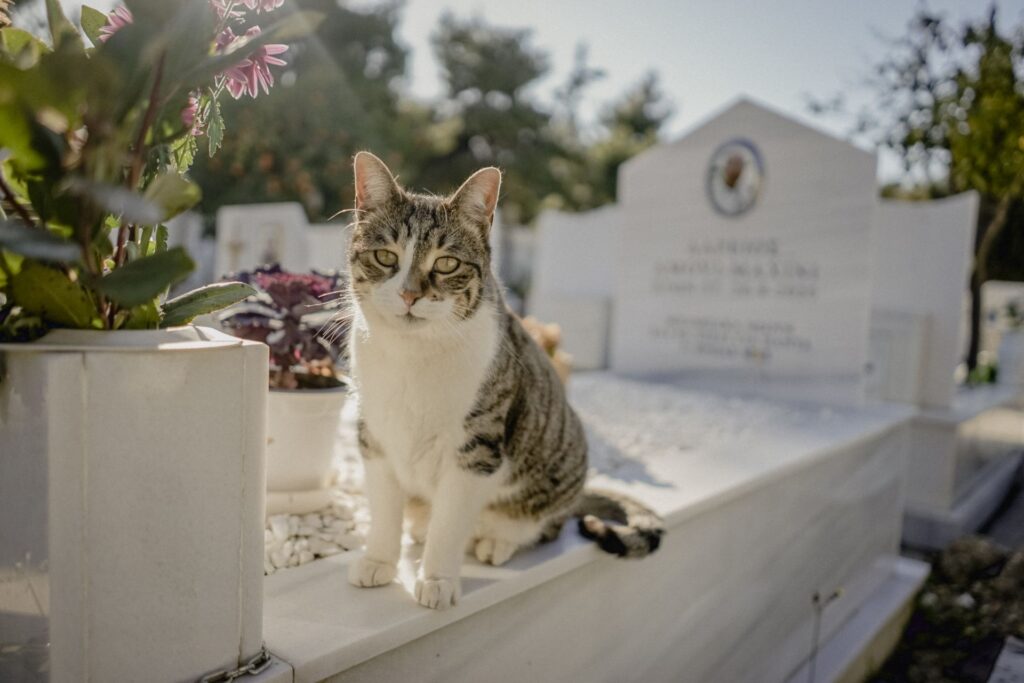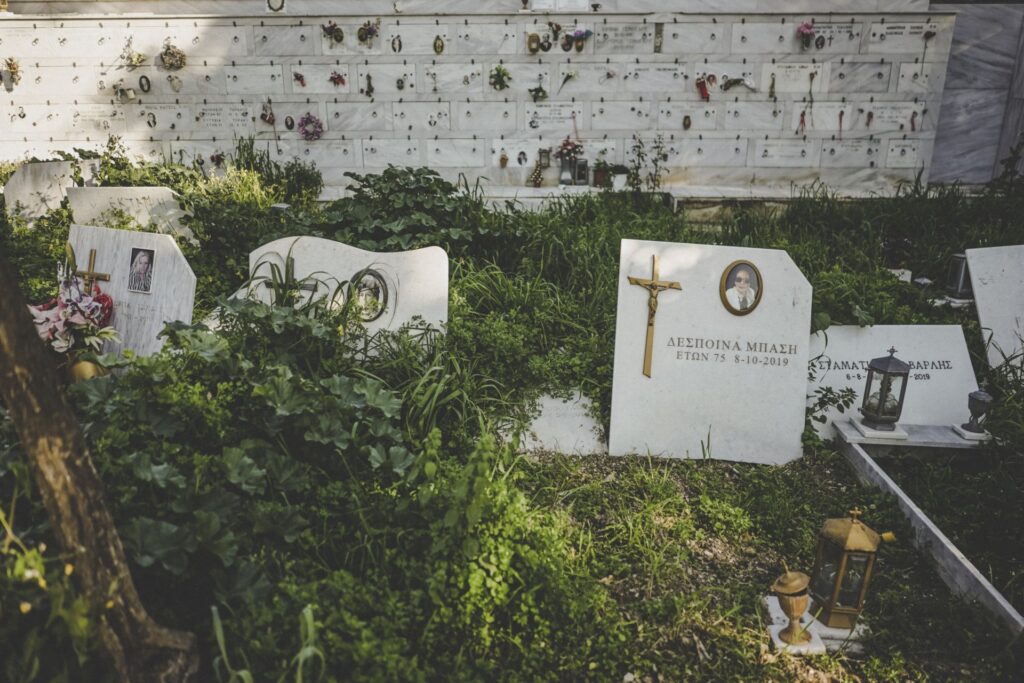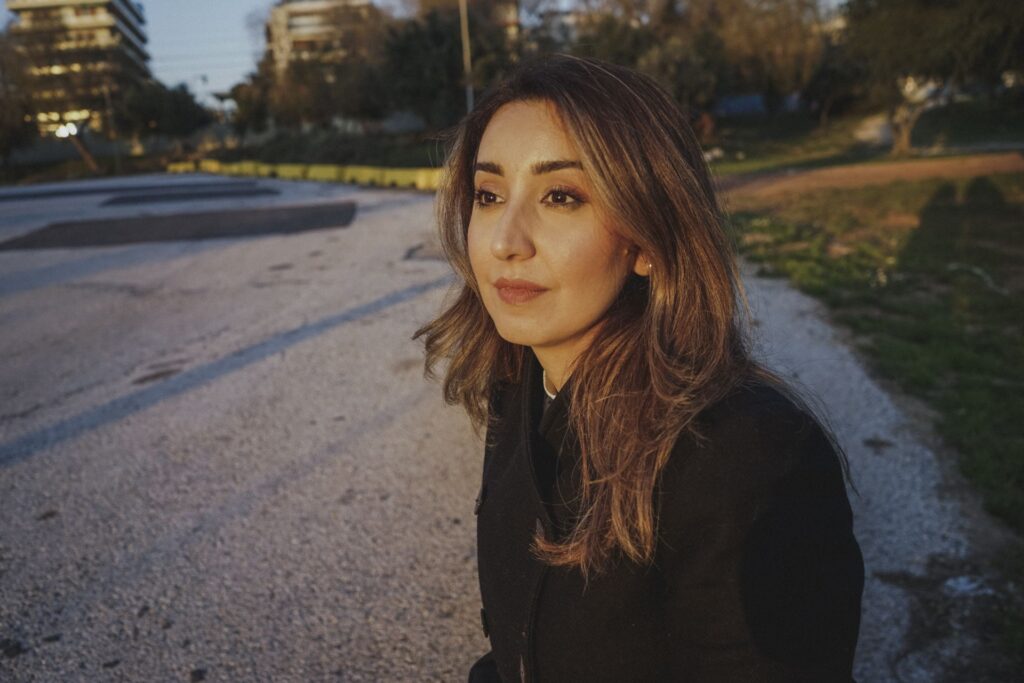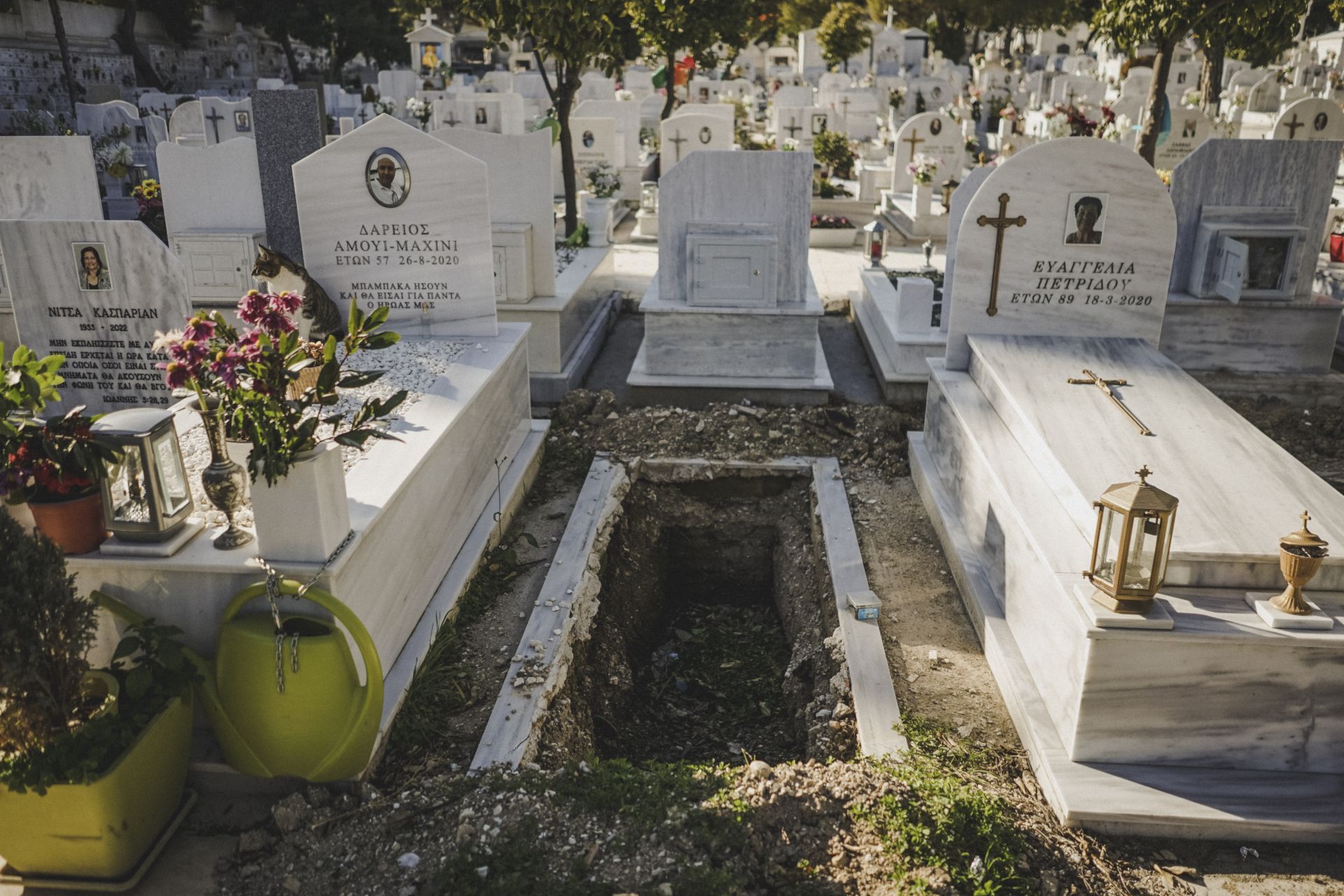Nassim Amoui, 32, parks her car in front of the cemetery in Palaio Faliro, a coastal district in south Athens, where her late father Darius is buried. Sunbeams filter through the dense pine branches illuminating the white marble tombs as she walks through the narrow path between rows of graves. The air is heavy with the distinct scent of Greek cemeteries: a mix of fresh flowers, pine and burning “livani” — incense made from aromatic resin whose fragrant smoke is believed to carry prayers to heaven and purify the souls of the departed. The dirge of a mother visiting the grave of her son can be heard in the distance.

As Nassim approaches the grave of her father, a piebald cat with piercing green eyes emerges from the shadows, slinking through the gravestones to welcome Nassim with a series of friendly meows and head bumps. “This is Moira,” Nassim tells me while petting her furry friend. Moira wanders around Darius’ grave and rubs her head against it. “Sometimes I feel that there is a connection between this cat and my father,” Nassim sobs. “I can’t explain it, but I feel that Moira is a way to communicate with my father.”

Darius unexpectedly passed away in his sleep in August 2020 and is buried in this cemetery, a few miles from his family home. “The family wanted to have him close by so we can visit him often,” Nassim says. Darius was the family’s backbone, a Muslim from Iran who had lived in Athens for 20 years as a political refugee. He was a skilled carpenter who started a new life in Greece’s capital city with his wife and two children after fleeing Tehran.
Almost three years since Darius’ passing, Nassim still can’t speak about him without bursting into tears. He was her hero, protector and guide. He worked tirelessly to provide for their family and made sure that she and her brother were able to stand on their own feet in a country he loved but was “not ours,” as he used to say. “Here we have no relatives,” he would tell her. “We don’t have the family support we would have had in Iran.” He pushed her and her brother to be independent.
Nassim is now a midwife, working at an NGO-run clinic in Athens that provides medical services to asylum seekers. She has recently been certified as a beautician while also working evenings at her family’s Persian restaurant. She realizes that her father’s unwavering love and support have been the bedrock of her resilience, giving her the strength to overcome every obstacle in her path. The memories are important to her and having him close is reassuring. But this reassurance may soon disappear.
The fate of Muslims who pass away in Greece is fraught with complexities and uncertainties that are now presenting Nassim and her family with unwelcome challenges. As soon as Nassim’s father died she had a tough choice to make: bury him in Athens, knowing that his body would be exhumed after three years, as per Greek law, or send his body nearly 500 miles away to Thrace, in the northeast near the Greek-Turkish border, where the country’s only Muslim cemetery is located.
Exhumation is a distasteful prospect for any relative of the deceased, but overcrowding in Greece’s two largest cities — Athens and Thessaloniki — which together house more than half the country’s population, has made it a necessary measure. “When I recently lost a beloved family member, finding a burial site in Athens was nearly impossible,” says George Kalantzis, the Greek secretary general of Religious Affairs, in an attempt to convey the gravity of the situation. A contributing factor for the overcrowded cemeteries is the Greek church’s resistance to cremations, even though the government legalized the practice in 2006. The first crematorium did not open until October 2019.

As a result, three years after a funeral, families of the deceased are required to exhume their loved ones, wash their bones and place them in a metallic container before they are stored in a repository within the cemetery. In cases where the body has not decomposed adequately, the gravediggers must hastily reinter the remains for a few more weeks.
In Athens, the cost of acquiring a burial site in one of the city’s graveyards can fluctuate from 10,000 euros to a staggering 40,000 euros ($11,000 to $44,000). Should a family prolong their loved one’s burial, they may be burdened with an additional cost of up to $770 for every three months.
When it comes to the country’s Muslim minority, many feel ignored and sidelined by the Greek government, as there is no provision for them, since exhumation is not accepted under Islamic law. Burying loved ones thus becomes an ordeal.
“Muslims in Greece have to send the bodies to the other side of the country or they have to collect money from their community to send the body to the country of origin where it will be buried according to Islamic law,” says Anna Stamou, a Greek Muslim and public relations manager of the Muslim Association of Greece. “This can cost them 3,000 to 4,000 euros [$3,300 to $4,400].”
For 18 years, Anna and her husband, along with the wider Muslim community, have been advocating for an appropriate burial site for Muslims where their bodies will not be exhumed. “We feel that the resistance we face by the Greek state shows the systematic devaluing of the Muslim community so that it is never equaled in Greek society, not even in death,” she adds.
Kalantzis, who has served in his role for more than a decade, says that neither the current nor previous governments have directly opposed such efforts. But he emphasizes the challenges posed by limited space and the potential backlash from non-Muslim populations, since the law mandates exhumation or payment for burials after three years. Muslims, however, feel that the failure to provide a burial place for Muslims in Greece’s major cities is a political choice.
Religion has played a significant role in shaping Greek culture and national identity, with the Greek Orthodox Church playing a central role. During the Ottoman occupation, the church was a symbol of resistance, playing a crucial part in preserving Greek language and culture. A 2018 study from the Pew Research Center indicates that three-quarters of Greeks believe that being Orthodox is at least somewhat essential to being genuinely Greek.
Nassim, who lived most of her life in Greece and was brought up as a liberal Muslim, feels lost. “When my father died, I found myself between two cultures. On one hand, I had to find a way to bury my dad according to our [Islamic] traditions in a cemetery I could visit, and on the other hand most imams were refusing to bury my dad because I finally decided to let him rest in the nearby cemetery among Christians.”

Nassim stares at the hole dug next to her father’s grave — another exhumation from a few days ago. She knows that time is running out for her father, too, but she is willing to fight for his final resting place. “I’m taking the municipality to the court as they are responsible for providing burial space for non-Christians,” she says. “I might be the first Muslim doing that.”
Sign up to our mailing list to receive our stories in your inbox.



